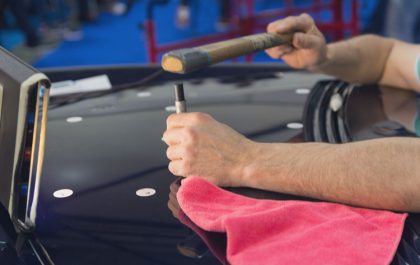Alloy wheels are, without question, the best choice for any car you want to be seen in. On the other hand, you might not realise that alloy wheels offer an array of other features in addition to their good looks. Any vehicle owner searching for enhanced robustness, reduced overall weight, and limitless customisation options should consider alloy wheels. Higher-end alloy wheels come with a greater level of responsibility for maintaining and caring for their desirable features. Here, we’ll go over everything you need to know about alloy wheels to keep them looking fresh, as well as tackle some of the most commonly asked questions about alloy wheel repair. Continue reading to learn more about alloy wheels and why they are superior to traditional steel wheels.
What Is An Alloy Wheel, Exactly?
An alloy wheel is manufactured from a combination of metals or other materials that were first popularised in racing, where performance is the main industry driver. Alloy wheels were commonly created in the 1960s by mixing magnesium with different metals, hence the term “Mags.” These mag wheels provided drivers with a major performance edge over other aluminium alloys, which had issues with uniformity during the casting process.
However, as technology has progressed over the years, aluminium alloy casting techniques have been designed and now offer performance similar to magnesium alloys at significantly lower costs.
What Are The Benefits Of Alloy Wheels?
Alloy wheels have plenty of other cutting-edge benefits that go beyond their obvious aesthetic appeal. They last longer, look better and improve your car’s performance across the board.
For starters, they dissipate heat far more effectively. This may seem trivial, but it means they stay cooler when driving, which means less wear and tear on the tyres. Since the tyres survive longer, there are clear performance and cost benefits, as tyres are replaced less frequently. Alloy wheels are also totally sealed against the elements. This makes them ideal for tubeless tyres, giving them a significant benefit over steel wheels. Most steel wheels cause minor tyre pressure losses, which may seem negligible at first but pile up with time.
Similarly, alloy wheels are often lighter than steel wheels, resulting in increased performance and fuel economy. However, the lighter weight has performance advantages. Overall, you’ll have superior handling, braking, steering, and cornering, all of which are critical on the road, particularly the braking.
Understanding The Specs Of Your Alloy Wheels
Knowing the specifications of your alloy wheels is the first step in maintaining them. This means that if a problem arises, you’ll be prepared. You’ll have no trouble locating the necessary replacements, repair tools, or equipment for that particular alloy wheel.
Is It Possible For Alloy Wheels To Rust?
Alloy wheels, in theory, do not rust. You won’t get rust on an alloy wheel because the primary ingredient in the alloy Formula that makes up alloy wheels, aluminium, has an oxide coating that shields it from rusting. If your alloy wheels are scuffed, though, you may encounter corrosion. A scratch on the metal might reveal the layers beneath the protective surface, resulting in white-coloured corrosion patches. You may efficiently remove corrosion from your alloy wheels by applying alloy protected rust remover, the appropriate scrubbing brushes (often nylon rather than steel wool), and a water rinse.
Is It Possible To Weld A Crack In An Alloy Wheel?
Welding can be used to fix a crack in an alloy wheel. This procedure, however, should only be carried out by a specialist. When an alloy wheel is damaged and needs to be repaired, various variables must be addressed, including:
- The location of the crack
- The crack’s length
- The crack’s direction of travel and the alloy wheel’s general condition
These considerations can determine if an alloy wheel crack can be welded, fixed using a different method, or is beyond repair and requires replacement.
It’s amazing how much of a difference a 45-minute rim repair can make. Not only will you enjoy your newly polished wheels, but an alloy wheel repair can increase the worth of your car by thousands of dollars. Contact us today for a free quote.


